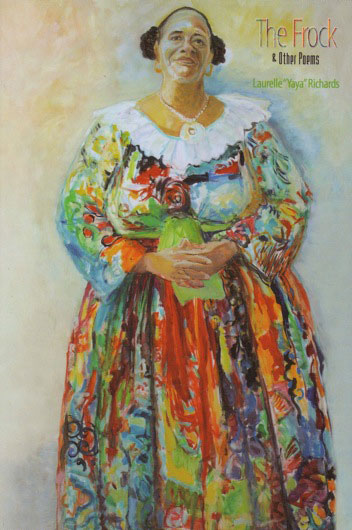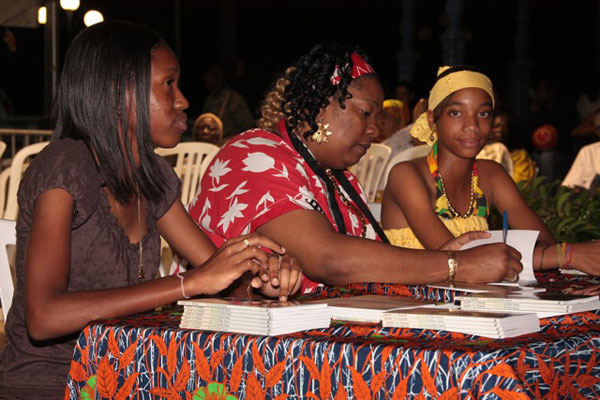|

|
 |
|
Last Updated: Feb 6, 2017 - 2:32:04 PM |

Laurelle “Yaya” Richards in her iconic storytelling frock. (Saltwater Collection)
|
St. Martin,
Caribbean -
The Frock & Other Poems by Laurelle “Yaya” Richards celebrates her memory, her words, her thoughts, the sentiments and feelings that drove her actions in favor of a more vibrant cultural expression, and a recognition of what it means to be from and for St. Martin.
When the book was launched in Marigot in February 2011, as the highlight of the UNESCO International Mother Language Day, it served as the best way to honor the late Yaya, a contemporary St. Martin woman of significance and an activist in her own right.
Over the last few days, re-reading The Frock & Other Poems and attempting to refresh a brief critique of the book, stirred aspects of my whole being, my past, my present, my future, my foundation as well as the identity I am still busy building, my internal construction, my nature.

The Frock & Other Poems by Yaya Richards.
|
I refer to Laurelle Richards as an activist because I believe that activism is needed in fields other than politics. Culture, the promotion of culture, the rightful definition of culture and its proper positioning and/or repositioning within our reality calls for activism. I called Yaya an activist because I remember her as the kind of person to: 1. SPEAK UP and address the issues regarding our culture; 2. EDUCATE herself before she took on the world; 3. STAND UP for what she believed in; 4. BUILD a solid network, a coalition, a movement; 5. PUBLICIZE her message to reach a broader audience (And her book is a concrete example of her message that lives on even after she passed away on May 27, 2010).
Consider her words in the opening poem of the collection:
Wake up this morning
Praising God and stretching to the new day
Under the green shadow of Paradise hill
The cool breeze of Kawtah
…
In her words, there’s a close connection between geography and cultural production. Immediately, right from the start of the book, voice is given to the volatile geography of St. Martin. Whatever the writer is involved in does not prevent her mind from wandering across her land. As she does this, she uses models of her own to express the realities of St. Martin as if to say that European literary models could not have allowed her to express herself.
Poetry and nature, expressed in most of her poems in the mother tongue, are implicitly linked in the idea of a kind of garden of Eden, a safe place, a place of hope. For her, this fusion, this blend with the land is also inseparable from a natural association with the “home” and the sense that the domestic space provides an obvious and uncomplicated site of belonging – a place which should, and can, be protected from outsiders, from colonial intrusion. Yaya’s unobtrusive subtlety in this regard may appear surprising or even subversive to some.

Young women at book party with copies of The Frock & Other Poems. (Saltwater Collection)
|
It can be said that Laurelle Richards writes exclusively in “S’Maatin English,” the everyday or domestic language of most St. Martiners, what Brathwaite has termed “nation language” (others have termed it mother tongue, mother language, or nation tongue, all implying that language and identity are linked).
The folkloric work of Yaya, for at least 10 years, has been highly influential in establishing S’Maatin English language and culture as an alternative, as an alter/native, indigenous, cultural resource instead of the appealing exclusively for acceptance and sole legitimization from European or “Yanking” cultural forms. Yaya, folklorist, spoken word artist (to use a current term), presents in The Frock & Other Poems the choice of employing S’Maatin English as a deliberate and self-conscious rejection of inherited poetic models. She creates her own, she draws from her own!
Though it is just one slim volume, I feel strongly that Richards’s work signals a shift away from purely innocent or passive landscape and nature, a shift from a constant focus on outside and the outsider to a consistent focus on St. Martin people and the privileging of St. Martin language as a powerful source of agency and national identity.
What I am foregrounding here is the importance of literary history manifesting itself before our eyes; what it excludes and includes at specific cultural moments and how this might be gendered; and what kind of writing it might, in turn, engender.
Yaya’s archive also encapsulates the strong, Black Caribbean woman. In “Precious Black Woman in Patchwork,” which is actually a modern set of fragments for the poet from Freetown, this monumental woman is perceived as rooted in the soil and having a robust physicality. Her vibrant speech provides amplitude with which to challenge European cultural norms that are elemental to the crude language that denies this Caribbean woman her womanhood; such definitive norms that even causes her own men and women folk to “dis” her very own femininity (hair, skin, facial features).
When reading this posthumous work, it is essential to “listen” to the author’s tone of voice at times. The diverse range of representations suggests that Richards’ is able to negotiate a variety of poetic paths through the somewhat contested terrain of Sweet St. Martin Land. In doing so, she perhaps negotiates different poetic models but for sure, she challenges and transgresses them deliberately.
For example, I love how Yaya presents tilling soil, picking salt, or ponging pan as a way of reading or interpreting history. As she puts herself in the place of the one she describes and carries on her activity she shares with the reader what she finds buried in the village soil, in the salt pond, in the steel pan. Here nature is not presented as innocent or outside of history, nature becomes always already imbricated in history; earth, our land, becomes an archive, which, with patience and humility, can be read.
To endorse Richards’ work and the St. Martin language, is to recognize her description of the home or the yard, our home, our yard, as separate and distinct from public spaces and institutions in which politics, mediated through “standard” languages, take place. She dares to present these private spaces as representative of areas uncontaminated by an unmediated outside influence, by colonial culture. In this way, Yaya’s work is essentially representative of mother tongue and mother culture at work, and not in any simple way, it is representative of St. Martin, the whole island, as an industrious and creative motherland or “mothernation” (as Sekou termed it in the early 1990s).
In closing, the poems of Laurelle “Yaya” Richards serve us now, to assess: Our language is an archives collection, a library and a wealth of knowledge; Anyone who denies us access to information in our mother tongue actually denies us a fundamental right.
It is a serious error to think that a nation, a territory or a country, can reach its full productive potential if the people of that nation are forced to work, in their own land, in a language that is foreign to them. Multilingualism is a political obligation essential when attempting to democratize the society; it gives each one an opportunity to lend his/her contribution. Language is a source of creativity, spontaneity and self-esteem; it is an element of our identity.
Someone said: “To have English as mother tongue, is to dominate the world.” In the title poem “The Frock,” Laurelle Richards puts it this way: “St. Martin culture opens us to the world and opens the world in us.”
We language, therefore, provides us with a fair chance of playing a more significant role. Let’s embrace our reality and prove to Yaya and to all those who went before that we will preserve and generate dynamically what’s ours and thereby make our contribution to the redefinition of our villages, our nation, our island, and our region, the Caribbean!
The Frock & Other Poems was published by House of Nehesi Publishers and is available at Arnia’s, Van Dorp, and Roland Richardson Gallery.

© Copyright 2011 by thebahamasweekly.com
Top of Page
|
|
 |

|
